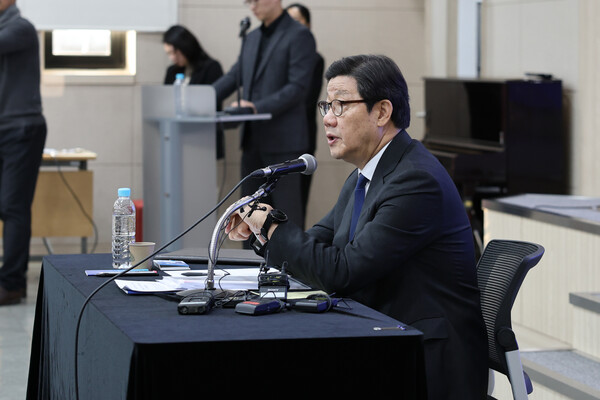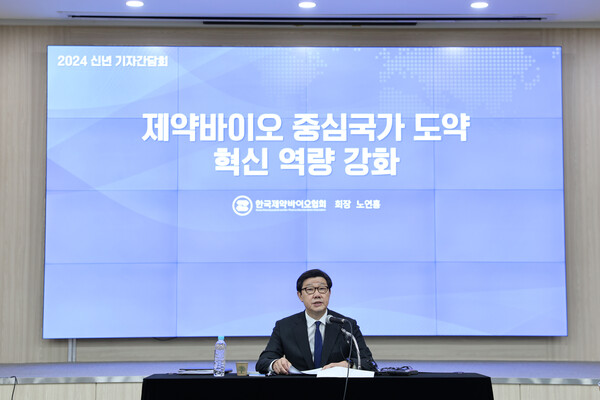Stresses Chairman Noh of Korea Pharmaceutical & Bio-Pharma Manufacturers Association
By Vice Chairman Choe Nam-suk, Special Feature Editor Cho Kyung-Hee
Chairman Yunhong Noh of the Korea Pharmaceutical and Bio-Pharma Manufacturers Association said, “We will strengthen our innovation capabilities and make Korea a leading pharma-bio country in the world.”
Speaking at 2024 New Year Press Conference at the Association head office in Seoul on Jan. 30, 2024, Chairman Noh said that he will do his level best for the development of bi-pharma industry in Korea. Details of the discussions at the meeting as well as the main points stressed by Chairman Noh follow:

Since the COVID-19 pandemic, call for a "pharma-bio powerhouse" in Korea has come to the fore as a need of the hour, spurring innovation in related industries. In the wake of accelerating national prioritization and economic slowdown, countries around the world are preparing for the future by strengthening support for the pharma-bio industry to establish health security and sustainable economic growth.
Governments' commitment to fostering the pharma-bio industry is unwavering.
Since selecting the aim to become a global center for bio and digital health as a key national task, the government has refined the framework for fostering the industry, including the strategy for creating a new market for bio and digital health and the establishment of the third five-year comprehensive plan for fostering and supporting the pharmaceutical bio industry.
In addition to the designation of bio as a national high-tech strategic industry, the creation of the 1-2 bio vaccine fund, the launch of the bio health innovation committee at the pan-government control tower, and institutional reforms to strengthen the foundation for self-reliance in raw materials and pharmaceuticals have been made.
The pharma-bio industry is at a turning point.
We are transferring innovative new drug technologies developed by our own hands to global pharma realm and developing new drugs that can compete in the global market one after another.
During the COVID-19 pandemic, we contributed to overcoming the national crisis by supplying medicines in stability. We are diversifying our global strategies beyond drug exports by acquiring local companies and production facilities and establishing distribution networks, and we are breaking down the boundaries of borders and industries by accelerating the entry of other industries such as large companies into the pharma-bio sector.
The demand for industrial innovation is intense.
We need to build a solid foundation for leapfrogging to overcome conventional wisdom and limitations. We will accelerate the development of new drugs through convergent innovation, bold R&D, and open innovation, including the use of AI.
We will also strive to build a quality management system, strengthen the drug supply chain, and establish a fair-trade order. Our association and industry will make 2024 the "Year of Innovation" to become a pharma-bio-centered country.
The BioHealth Innovation Council, a pan-governmental control tower for fostering the pharma-bio industry, is in full operation, and the government's fostering mechanisms such as improving the drug pricing system to reflect the value of new drug innovations are visible.
Securing more than 2,000 new drug pipelines by strengthening research capabilities, expanding exports of new drug technologies and entry into overseas markets, and enhancing AI drug development capabilities.
We will actively create an environment for pharma-bio digital innovation!
We will support the creation of data-based digital healthcare services such as e-CRO, decentralized clinical trials, digital therapeutics, smart factories, etc., and we should try to lead participation in the collaborative learning-based new drug development acceleration project.
We should also try to revitalize the activities of the AI New Drug Convergence Research Institute, which expanded and reorganized the Association's AI New Drug Development Support Center.
There are conditions for the acquisition of such aims. In order to achieve our goals, we need to:
-- Increase national prioritization that has led to competition among countries around the world to base development and production of vaccines and essential medicines in their own countries, raising the level of demands on companies' manufacturing and quality control.
--Try to improve the lack of preferential policies to promote R&D and facility investment in domestic raw materials despite low self-sufficiency rate of raw materials and increasing dependence on foreign countries, which increases the risk of drug supply and demand instability.
--Also, try to strengthen the domestic production base of raw materials and essential drugs
--Expand the provision of incentives such as tax benefits for domestic raw materials and strengthen the drug price compensation system for essential drugs produced using domestic raw materials.
--Expand the list of national essential drugs and preventive drugs by improving the selection criteria, and preparing comprehensive measures such as timely reflection of cost increase factors.
--Build development and production infrastructure for future public health crises
--Establish a stable supply system for improved drugs and generic drugs (70% of domestic finished drugs) to prevent drug supply and demand instability and secure the momentum for new drug development.
--Establish an institutional foundation for the development of vaccines and therapeutics, including expanding support for R&D of next-generation vaccine source technologies such as mRNA.
Introduction of Koran pharmaceutical industry by Chairman Noh:

The Pharmaceutical industry in Korea is developing new drugs and expands into the global marker--becoming a pharmaceutical powerhouse that provides health and jobs with the people.
The pharmaceutical industry in Korea has a long history of nearly 120 years, and it has been more than 70 years since the foundation of the Korea Pharmaceutical and Bio-Pharma Manufacturers Association (KPBMA).
Up until now, the Korean pharmaceutical industry has been working hard in order to improve the nation-and more efficient high-quality drugs, to expand R&D investment in medicinal products so that we can keep pace with the most advanced pharmaceutical firms in the world, and to continue expanding our cutting-edge manufacturing facilities. In 2018, as a result, we are seeing more and more domestic medicinal
What the KPBMA and its 194 member companies is focusing on, besides new drug development through R&D investment and global market entrance, is the establishment of transparent distribution order. Following the establishment of Code of Ethics and Voluntary Compliance Program for Fair Trade, to this end, well about our efforts to practice ethical management. Now in 2018, we are trying to introduce ISO 37001, global standard for anti-bribery management system, to further our efforts for ethical management. Also, as a responsible member of society, the KPBMA is making various social contributions to meet social to the national economy, while proposing values and visions for Korean pharmaceutical industry to the people of Korea, communicating with them to share our visions.
We look forward to your support and encouragement.

